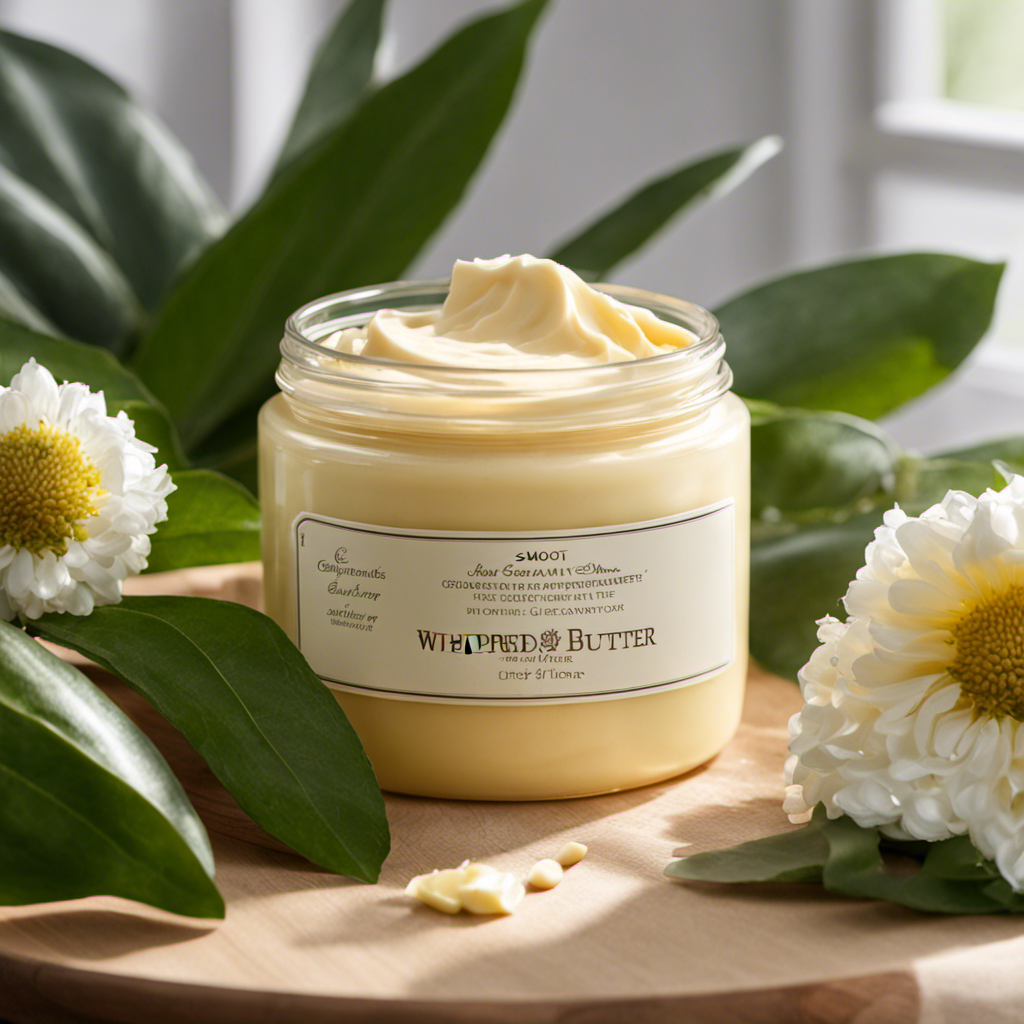I have to admit, everyone, there’s something truly special about homemade apple butter. That delicious scent spreading through your kitchen, its luxurious, creamy consistency gliding smoothly over a piece of warm bread – it’s absolute delight.
But here’s the thing: how long does this heavenly creation actually last? That’s what we’re diving into today, my friends. I’ve done my research, tested it out myself, and I’m here to give you the lowdown on the shelf life of homemade apple butter.
So grab a spoon, let’s get started.
Key Takeaways
- The shelf life of homemade apple butter is affected by factors such as the method of preparation, storage container, storage temperature, exposure to light, and the use of preservatives or additives.
- Proper storage conditions, including cooler temperatures and airtight containers, can help extend the shelf life of apple butter and maintain its quality.
- The use of natural ingredients in homemade apple butter provides flavor and preservation qualities, while avoiding potential health risks associated with preservatives.
- Proper storage techniques, such as using clean jars, allowing the apple butter to cool before transferring, leaving headspace in jars, refrigerating, and labeling for freshness tracking, can help prolong the shelf life of apple butter.
Shelf Life of Homemade Apple Butter
If you make homemade apple butter, you’ll want to know how long it lasts on the shelf. The shelf life of homemade apple butter can vary depending on several factors.
One of the main factors affecting spoilage is the method of preparation. If the apple butter is properly cooked and sealed, it can last for up to a year. However, if it is not sealed correctly or if it is stored in a container that is not airtight, it may spoil within a few weeks.
Another important factor is the storage temperature. Apple butter should be stored in a cool, dark place to prevent spoilage. The best containers for storage are glass jars with tight-fitting lids, as they provide an airtight seal and protect the apple butter from light exposure.
Factors Affecting the Longevity of Apple Butter
When it comes to the longevity of apple butter, the storage conditions play a crucial role. Factors such as temperature, humidity, and exposure to light can significantly impact its shelf life.
Additionally, the use of preservatives or additives can also influence the longevity of apple butter, as certain ingredients can help inhibit the growth of bacteria or mold.
Storage Conditions Impact
To ensure your homemade apple butter lasts as long as possible, make sure you store it in a cool, dark place. Temperature plays a crucial role in the storage of apple butter. Storing it at high temperatures can lead to spoilage and a shorter shelf life. Exposure to air is another factor that affects the longevity of homemade apple butter. When apple butter is exposed to air, it can undergo oxidation, resulting in a change in flavor and texture. To better understand the impact of temperature and air exposure on apple butter storage, refer to the table below:
| Temperature (°F) | Shelf Life |
|---|---|
| Below 40 | 6-12 months |
| 40-50 | 4-6 months |
| Above 50 | 2-4 months |
It is clear that storing apple butter at cooler temperatures significantly extends its shelf life. Additionally, minimizing air exposure by using airtight containers or sealing the apple butter with wax can help maintain its quality for a longer period.
Preservatives or Additives Used?
Preservatives or additives are commonly used to extend the shelf life of commercially produced food products. However, when it comes to homemade apple butter, I prefer to use natural ingredients and avoid the use of preservatives.
Natural ingredients like apples, sugar, and spices provide enough flavor and preservation qualities on their own. Not only does this approach enhance the taste and quality of the apple butter, but it also eliminates the potential health implications associated with consuming preservatives.
Studies have shown that some preservatives, such as sodium benzoate and nitrites, can have negative effects on human health when consumed in large quantities. By sticking to natural ingredients, I can confidently enjoy my homemade apple butter without worrying about any potential harm to my wellbeing.
Proper Storage Techniques for Apple Butter
When it comes to storing apple butter, understanding shelf life guidelines is essential.
Shelf life guidelines provide recommendations on how long apple butter can be stored before it starts to spoil.
Additionally, the debate between refrigeration and canning as storage methods for apple butter is worth exploring, as both have their pros and cons.
Lastly, recognizing the signs of spoilage is crucial to ensure the safety and quality of the apple butter, as it can indicate when it should no longer be consumed.
Shelf Life Guidelines
If stored properly, your homemade apple butter can last for several months in the refrigerator. However, it’s important to follow some shelf life recommendations and storage tips to ensure the freshness and quality of your apple butter.
Here are some key points to keep in mind:
- Use clean, sterilized jars for storing apple butter to prevent any contamination.
- Make sure to cool the apple butter completely before transferring it to the jars.
- Fill the jars leaving about 1/4 inch of headspace to allow for expansion during freezing.
- Store the jars in the refrigerator rather than at room temperature to prolong the shelf life.
- Label each jar with the date of preparation to keep track of its freshness.
Refrigeration Vs. Canning
To maintain the freshness of your homemade apple butter, refrigeration is recommended over canning. While canning is a popular method for preserving food, it may not be the best option for apple butter. Refrigeration offers several benefits that canning lacks. First, refrigeration helps to slow down the growth of bacteria and other microorganisms that can cause spoilage. It also helps to retain the flavor and texture of the apple butter for a longer period of time. Additionally, refrigeration allows for easy access and quick consumption of the apple butter, without the need for additional preparation. On the other hand, canning has some drawbacks when it comes to apple butter. It requires a longer processing time and can alter the taste and texture of the butter. It also requires more equipment and can be more time-consuming. Therefore, if you want to enjoy your homemade apple butter for an extended period of time while maintaining its quality, refrigeration is the way to go.
| Benefits of Refrigeration | Drawbacks of Canning |
|---|---|
| Slows down bacterial growth | Longer processing time |
| Retains flavor and texture | Alters taste and texture |
| Easy access and quick consumption | Requires more equipment and time-consuming |
Signs of Spoilage
You can easily tell if your refrigerated apple butter has spoiled by checking for any mold or off smells. Spoilage can occur due to a variety of factors, including improper storage, contamination, and the presence of bacteria or fungi.
To prevent apple butter from spoiling, it is important to follow proper canning procedures, ensure that the jars are sealed tightly, and store them in a cool, dark place.
Here are a few tips to keep your apple butter fresh for longer:
- Use sterilized jars and lids to prevent contamination.
- Fill the jars with hot apple butter, leaving a ¼-inch headspace.
- Process the jars in a boiling water bath for the recommended time.
- Store the jars in a cool, dark place to maintain quality.
- Check the jars periodically for signs of spoilage, such as mold or off smells.
Signs of Spoiled Apple Butter
The signs of spoiled apple butter include a foul odor and mold growth. When apple butter goes bad, it emits a pungent smell that is easily distinguishable. This foul odor is a clear indication that the apple butter is no longer safe to consume.
In addition, mold growth is another sign of spoilage. Mold can appear as green, white, or black spots on the surface of the apple butter. It is important to note that consuming moldy apple butter can lead to foodborne illnesses.
Proper storage and handling techniques can help extend the shelf stability of apple butter. It is recommended to store apple butter in a cool, dark place and refrigerate after opening to prevent mold growth and prolong its shelf life.
Does Apple Butter Go Bad
Now that we have discussed the signs of spoiled apple butter, let’s move on to the question of whether apple butter can go bad.
The shelf life of store-bought apple butter can vary depending on a few factors. Generally, unopened jars of apple butter can last for about a year if stored properly in a cool, dry place. Once opened, the apple butter should be refrigerated and consumed within a few weeks.
However, it’s important to note that the quality and taste of apple butter may deteriorate over time even if it hasn’t spoiled. To determine if apple butter is still good, here are a few indicators to look for:
- Check for any signs of mold or unusual discoloration.
- Smell the apple butter for any off or sour odors.
- Look for changes in texture, such as separation or clumping.
- Taste a small amount to ensure it hasn’t developed a rancid or off taste.
- Pay attention to the expiration date or best-by date on the label.
Extending the Lifespan of Homemade Apple Butter
To prolong the freshness of your homemade apple butter, remember to properly store it in an airtight container and refrigerate it promptly after opening.
This is crucial for extending the lifespan of your apple butter and preventing spoilage. By placing the apple butter in an airtight container, you create a barrier that prevents air and moisture from entering, which can accelerate spoilage.
Additionally, refrigerating the apple butter slows down the growth of bacteria and mold, further preserving its freshness. It is important to note that homemade apple butter typically lasts for about 2-3 weeks when stored properly in the refrigerator.
However, if you want to extend its freshness even further, you can consider freezing it. Freezing can prolong the lifespan of apple butter for up to 6 months, ensuring that you can enjoy its delicious flavor for a longer period.
How to Store Apple Butter for Maximum Freshness
For maximum freshness, make sure you store your homemade apple butter in an airtight container and refrigerate it promptly after opening. Storing apple butter properly is crucial to preserving its freshness and flavor.
Here are some tips to help you store your homemade apple butter effectively:
- Use clean, sterilized jars or containers to store your apple butter. This helps prevent contamination and extends its shelf life.
- Fill the containers to the top, leaving minimal headspace. This reduces air exposure and helps maintain freshness.
- Label the containers with the date of preparation. This allows you to track its freshness and use it within a reasonable timeframe.
- Keep the apple butter in the refrigerator, as the cold temperature slows down microbial growth and helps preserve it for longer.
- Avoid storing apple butter near strong-smelling foods, as it can absorb odors easily.
Can You Freeze Homemade Apple Butter?
If you want to extend the shelf life of your homemade apple butter, you can freeze it in airtight containers. Freezing apple butter is a great option for preserving its freshness and flavor. When properly frozen, apple butter can last for up to 12 months in the freezer.
To freeze apple butter, first, ensure it has cooled completely. Then, transfer it into freezer-safe containers, leaving some space for expansion. Seal the containers tightly and label them with the date.
Alternatives to freezing apple butter include canning and refrigeration. Canning involves processing the apple butter in jars and sealing them in a water bath or pressure canner. This method can provide a longer shelf life, but it requires more time and equipment.
Refrigeration is suitable for short-term storage, typically up to a month. However, freezing remains the best option for long-term preservation of homemade apple butter.
Frequently Asked Questions
Can I Use Apple Butter That Has Been Stored for Over a Year?
Yes, you can use apple butter that has been stored for over a year. However, it’s important to check for signs of spoilage such as mold or off flavors. For apple butter storage tips and homemade recipes, consult reliable sources.
Is It Safe to Consume Apple Butter That Has Changed in Color or Texture?
Yes, it is safe to consume apple butter that has changed in color or texture as long as it doesn’t have an off flavor or smell. To prevent color or texture changes, store it in a cool, dark place and use proper canning techniques.
Can I Still Use Apple Butter if It Has Developed Mold?
If homemade apple butter has developed mold, it is not safe to consume. Mold can produce harmful toxins. However, you can still use moldy apple butter for other purposes, such as cleaning or composting. Signs of spoilage in apple butter include an off smell, unusual color, or visible mold growth.
How Long Can I Keep Apple Butter in the Refrigerator After Opening?
After opening, I can keep homemade apple butter in the refrigerator for about 2-3 months. To make homemade apple butter, I follow a recipe that includes cooking apples, sugar, spices, and simmering until thick. The best ways to preserve it are by canning or freezing.
Can I Use Apple Butter That Has Been Stored at Room Temperature for Several Months?
I wouldn’t recommend using apple butter that has been stored at room temperature for several months. It’s important to follow proper apple butter storage tips for the best ways to preserve it.
Conclusion
In conclusion, homemade apple butter can be a delicious and versatile addition to your pantry. By properly storing it and taking precautions to extend its lifespan, you can enjoy its rich flavor for months to come.
With the right storage techniques and the option to freeze it, you can ensure maximum freshness and minimize the risk of spoilage. So go ahead and whip up a batch of this timeless treat, knowing that it will last and provide a delightful taste of autumn whenever you need it.
Happy preserving!









